
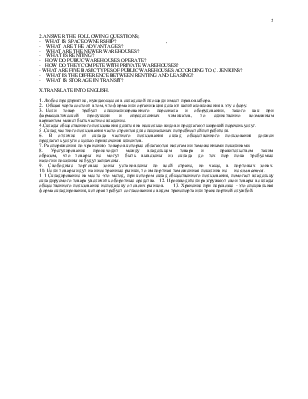
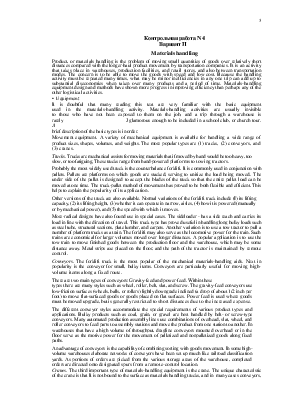
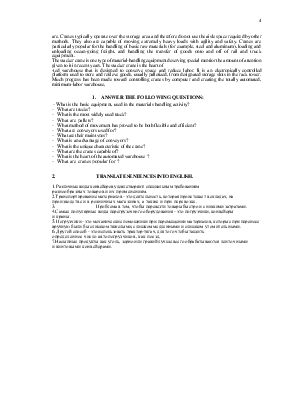
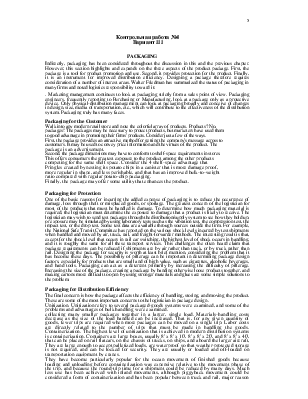
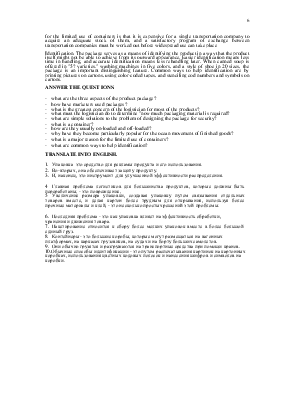
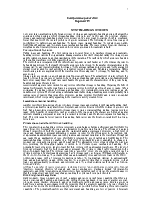



Контрольнаяработа№4
Вариант 1
Warehouse Types
Any organization in need of storage space has a number of
options. These choices are (I) owning, (2) renting, (3) leasing, and (4) storing in
transit. Each offers a different level of cost, risk, and managerial involvement
Space ownership.. Most manufacturing firms and service organizations own storage space in some form. The form may range from a back room for office supplies to a finished-goods warehouse with hundreds of thousands of square feet. However, the common feature is that the firm or organization has a capital investment in the facility. For this investment, the company expects a number of advantages, such as:
• Less expensive warehousing than is possible with renting or leasing, especially if there is high utilization of the facility roost of the time
•A higher degree of control over warehousing operations, which helps to assure efficient - warehousing and a high level of service.
•The benefits that accrue from real estate ownership
•The space may be converted to other uses, such as manufacturing, at a future time.
The space may serve as a base for a sales office, private truck fleet, traffic department, or purchasing department.
If tbe product requires specialized personnel and equipment, such as with pharmaceuticals and certain сhemicals, private ownership may be the only alternative available.
Frequently, the incentive for private ownership of space is to realizes good return on the investment in the space. For this return, management must assume more administrative headaches associated with labor and governmental regulations, and the risk of the loss of capital if the projected savings do not materialize. These problems often lead management to a non-ownership alternative.
The modern private warehouse is truly an example of productivity improvement through me application of modem technology, The newer warehouses are typically single-story, are on the average larger than the replaced older facilities, show a high degree of automation and computer use for high throughput, and are built like fortresses to reduce the chance of fire, break-in, and building deterioration.
Renting. A company may avoid storage-space ownership altogether by taking advantage of the services offered by the thousands of public warehouses located throughout the country. Public warehouses operate in a manner similar to the common carriers in transportation. That is, they provide services on a fee basis to a number of users. Public warehouses have a great appeal to the user who needs to expand or contract storage space in a short period of time or to relocate the storage space frequently. Storage rates are typically quoted for as short a term as one month. Public warehouses compete with private warehouses by accepting users whose storage patterns mesh in a way that provides for a year-round high utilization of the available storage space. The private warehouse may have seasonal periods of underutilization of capacity because of the limited line of goods stored in it. Therefore, the rates charged by the public warehouse may be as low as, if not lower than, the costs incurred in the use of a private warehouse. Documentation and legal concerns. Public warehouses are custodians of public property. With this responsibility, there are certain liabilities they agree to accept. In the standard contract terms and conditions approved by the American Warehousemen's Association, the following section on liability appears:
The warehouseman shall not be liable for any loss or injury to goods stored however caused unless such loss or injury resulted from the failure by the warehouseman to exercise, such care in regard to them as a reasonably careful man would exercise in like circumstances, and the warehouseman re not liable for damages which could not have been avoided by the . exercise of such care. The essence of this statement is to say that the legal responsibility of public people is to exercise reasonable care in the handling and storage of the goods in their custody. If the damages or losses could not have been avoided by the exercise of
reasonable care, the warehouse is not held liable for the losses unless specific contractual arrangements have been made to cоvеr them. The owner of the merchandise may wish to
extend his or her protection against liability and casualty losses through insurance protection or by writing into the contract with the public warehouse a provision for added liability, for which the warehouse makes an additional charge
Because public warehouses operate in the public interest, several states maintain regulatory control through the Public Utilities Commission in the particular state. However, regulation is not as extensive as it once was and now involves warehouses only in the states of California, Minnesota, and Washington. The Uniform Commercial Code, which covers public warehouses in all states except Louisiana, defines the responsibilities of the public warehouse and establishes uniformity in issuing warehouse receipts. In Louisiana, the. Uniform Warehouse Receipts Act defines the responsibilities of warehouse people.
Уважаемый посетитель!
Чтобы распечатать файл, скачайте его (в формате Word).
Ссылка на скачивание - внизу страницы.